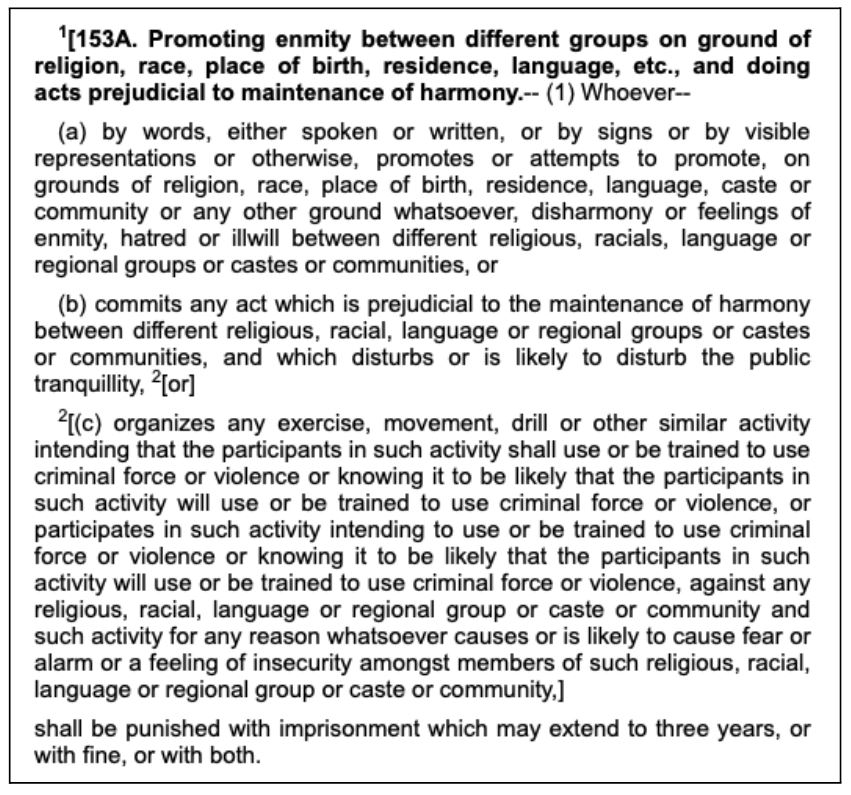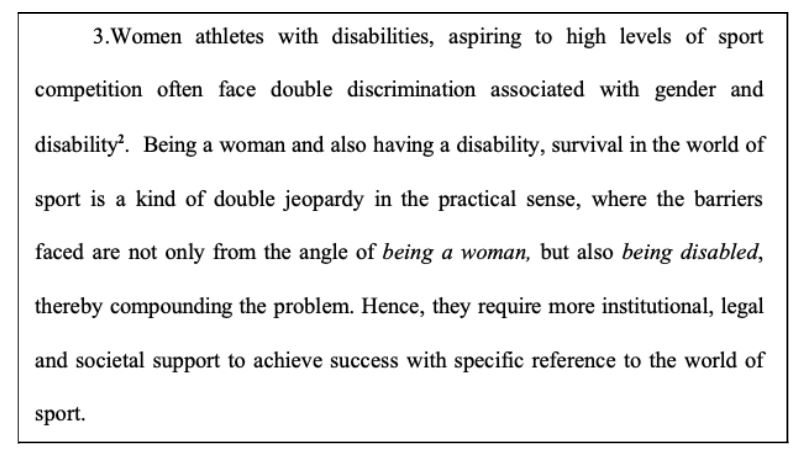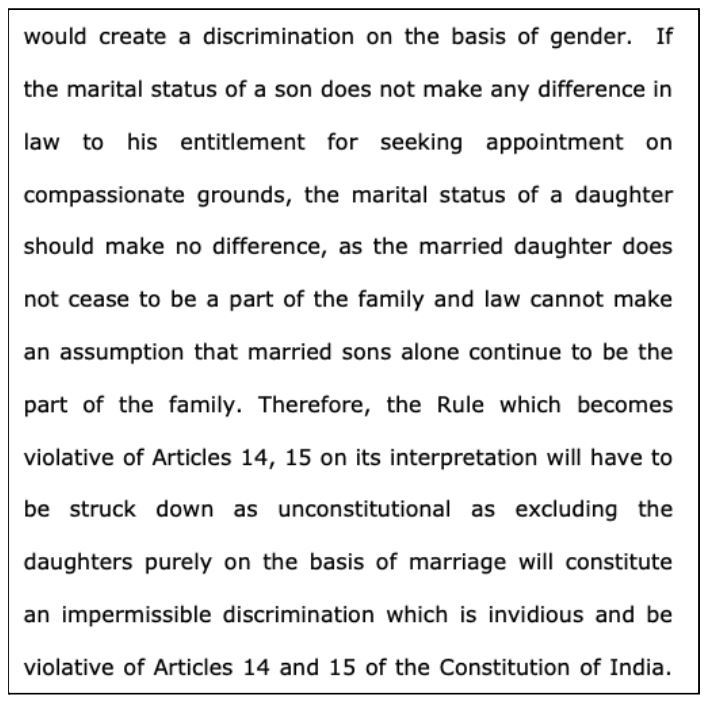In this roundup of court judgements, we look at Constitutional Courts’ remarks & directions about the liability of WhatsApp Group Administrators, persons fraudulently getting pensions meant for political prisoners, treatment of disabled women athletes, and discrimination between unmarried and married daughters in compassionate appointments.
Madras HC: Endorses Bombay HC Judgment; WhatsApp Group Administrator not vicariously liable for objectionable posts by members.
In the case R. Rajendran vs. The Inspector of Police & Kathirvel, the Madras High Court granted relief to an administrator of a WhatsApp group in an FIR registered over offensive messages posted in the group by a member.
The petitioner had formed a WhatsApp group named “Karur Lawyers “. He was the group administrator. In the said WhatsApp group, certain highly offensive messages were posted by one of the members (named Pachaiyappan). Another member of the group, who is also a practicing lawyer, lodged an FIR was registered against the petitioner for offences under Sections 153A.

The counsel for the second respondent argued that after the objections were raised, the petitioner (R. Rajendran) removed Pachaiyappan from the WhatsApp group. However, he re-inducted him within a few days. This indicated that there was collusion between the petitioner and the said Pachaiyappan.
Upon examining all submissions, the Madras high court referred to Bombay high court’s judgment in Kishore vs. State Maharashtra (2021), where it held that there is no vicarious liability on a WhatsApp group Administrator for the objectionable content posted by a group member unless it can be demonstrated that there was a common intention or pre-arranged plan between such member of a WhatsApp group and the administrator.
The Additional Public Prosecutor submitted that only forensic report will reveal if the message was posted by Pachaiyappan (person who posted the allegedly offensive content in the group) or whether it was posted in his name by the petitioner/WhatsApp group Administrator.
In conclusion, the high court held that since the forensic report regarding the role of the petitioner (WhatsApp group Administrator) was awaited, it was premature to entertain the petition. At the same time, the high court observed that the police should bear in mind the principles laid down in the abovementioned Bombay High Court judgment.
The bench ruled that if the petitioner had played the role of a group administrator alone and nothing else, then while filing a final report, the petitioner’s name shall be deleted.
Allahabad HC: Directs State Govt to ascertain how many persons fraudulently getting pension meant for political prisoners of 1975-emergency era.
In the case Ashok Kumar Shamsa and others vs. State of UP and others, the Allahabad high court has asked the State of Uttar Pradesh to specify as to how many persons are getting pensions fraudulently by showing themselves to be detained as political prisoners during the national emergency period from 25 June 1975, to 21 March 1977.
People detained under the Maintenance of Internal Security Act (MISA) and Defence of India Act (DIR) laws during the national emergency period are entitled to a monthly pension from their respective state governments.
The high court was hearing a Public Interest Litigation (PIL) plea filed by the President of Pilibhit’s Loktantra Rakshak Senani Sangathan, Ashok Kumar Shamsa who has claimed that many persons are fraudulently receiving monthly pension meant for political prisoners of the national emergency period.
In 2018, upon adjudicating this matter for the first time, the Allahabad High Court had called for a report from the district administration, and thereafter, in the inquiry conducted by the administration, five people were found to be receiving this pension fraudulently.
However, in the present PIL, the petitioner has contended that around 1500 persons are receiving the pension fraudulently. As the PIL highlights, there are about 6000 such Loktantra Senani in Uttar Pradesh and more than 35.35 crore rupees are being spent every month on their pension. Apart from this, they are also provided with free travel service on roadways buses and free medical facilities in district hospitals.
According to the petitioner, in Pilibhit district alone, many people are receiving the Loktantra fighters Pension even though they were not jailed as political prisoners during the national emergent era; instead, they were sent to jails on allegations of chain snatching, attempt to murder and other crimes. It has also been submitted that the petitioners are not satisfied with the inquiry conducted into the fraudulent names by the administration.
The petitioner also contended that in the last three years, the district administration has in fact doubled the number of persons claiming pensions.
The Bench of Chief Justice Rajesh Bindal and Justice Piyush Agarwal has directed the State of Uttar Pradesh to file an affidavit stating as to how many persons are being paid monthly pension and to ascertain whether they were political prisoners or were in jail on account of certain other offences committed by them.
Madras HC: Lays down guidelines for fair treatment of disabled women athletes, highlights ‘Intersectional Discrimination’ and condemns ‘Romantic Paternalism’
In the case M. Sameeha Barvin vs. The Joint Secretary, Ministry of Youth & Sports & Ors., the Madras high court issued comprehensive directions to streamline policy pertaining to women athletes and their fair treatment.
The high court was hearing an appeal filed by Sameeha Barvin, who is State and National level champion with gold and silver medals in the long jump and high jump. She was denied the opportunity of participation in the Fourth World Deaf Athletics Championship, 2021, held at Lublin, Poland and was able to participate on the strength of the interim order (dated 13 August 2021) from the high court.
When the petitioner participated in the National selection test conducted on 22 July 2021, at New Delhi, she excelled in jumping 5.5 meters in the long jump, surpassing the eligible parameter of 4.25 meters which is the requirement to get selected.
Despite such a performance, she was not selected to participate in the World Deaf Athletics Championship. When she sought the reason for her non-selection, it was disclosed that the selection authorities were not inclined to send a lone female member to the event and therefore, they have preferred male members for the event. Therefore, the petitioner has filed the present writ petition and on 13 August 2021, the ‘All India Sports Council of the Deaf’ was directed to declare her as selected and permit her to participate in the 4th World Deaf Athletics Championship held in Poland under the women category. The counsel for the petitioner also highlighted the mal-treatment from the officials of ‘All India Sports Council for the Deaf (AISCD)’ as well as Tamil Nadu Sports Council of the Deaf (TNSCD).
Justice R. Mahadevan observed that women athletes with disabilities often face double discrimination associated with gender and disability. The judgement highlights that when the axis of discrimination is not singular, but plural, multiple, cumulative, or intersectional, the same has to be viewed with an analytical lens in order to understand the problems and barriers faced by such persons.

The high court held that the case was a clear instance of ‘discrimination based on gender as well as the disability’ and that the state and central governments have failed in their responsibility to ensure support and safety to disabled women athletes.
In this backdrop, Justice R. Mahadevan discussed the concept of Intersectionality and its application in the Indian context. The bench noted that the proposition of intersectional discrimination by Kimberle Shaw has applicability in the Indian context since factors like gender and caste are intrinsically linked and the axis of discrimination almost always intersects.
The bench also noted that the discrimination caused to women is often couched in ‘protectionism’ citing traditional stereotyped roles and purported concern for their safety and security. The bench also highlighted the principle of ‘reasonable accommodation’ has been stipulated under section 2(y) of the Rights of Persons with Disabilities Act, 2016 (RPwD Act).
The court issued the following instructions:
- Concerned authorities including the Ministry of Youth & Sports, Sports Authority of India, All India Sports Council of The Deaf, Tamil Nadu Department of Welfare of Differently Abled Persons to enable disabled sportswomen to participate with ‘dignity and respect’ at all levels of competitions.
- Prohibition against discrimination against women athletes who are disabled on the grounds of gender, sex, religion, disability, marital status, social origin, etc.
- Adequate financial assistance must be provided to such athletes and to one of the family members who are accompanying them. The court instructed that a proper selection process based on merit, free medical facilities and training facilities must be ensured for the meritorious athletes.
- The respondent authorities also have the responsibility to provide disabled-friendly clothes, prosthetics and other materials while ensuring that the principle of ‘reasonable accommodation’ is given effect.
- Sensitizing male counterparts about equality, rewarding disabled women athletes adequately and giving them equal treatment on par with males.
Supreme Court: No discrimination between unmarried and married daughters in compassionate appointments.
In the case State of Karnataka & Ors. vs. C.N. Apporva Shree & Anr., the Supreme Court upheld Karnataka high court’s affirmation that a married daughter is also entitled to an appointment on compassionate grounds and there cannot be any discrimination between an unmarried daughter and a married daughter.
The apex court was hearing a special leave petition by the state of Karnataka against a decision of the Karnataka high court regarding the appointment of a married daughter for a job on compassionate grounds.
The bench of Justices S. K. Kaul and M. M. Sundresh asserted their approval to the reasoning of the High Court, highlighting the rule/provision relied upon by the petitioner to deny a married daughter a job on compassionate grounds while permitting it to a married son has been quashed in the Bhuvaneshwari V. Puranik vs. State of Karnataka (2020) case. The bench reiterated the observations made in the above case where the high court held that excluding a married daughter from consideration for appointment on compassionate grounds is unconstitutional.
Justice M. Nagaprasanna significantly opined that the following:

In conclusion, the Supreme Court dismissed the state of Karnataka’s challenge to the Karnataka High Court’s affirmation in the case.
Featured Image: Important Court Judgments


